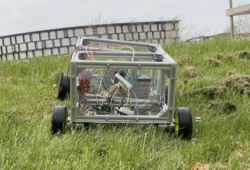Free Software Leftovers
-
Robotic Platform Is Open Sourced And User Friendly
Having a 3D printer or a CNC machine available for projects is almost like magic. Designing parts in software and having them appear on the workbench is definitely a luxury. But for a lot of us, these tools aren’t easily available and projects that use them can be out-of-reach. That’s why one of the major design goals of this robotics platform was to use as many off-the-shelf components as possible.
-
Self-hosted software I'm thankful for
Self-hosting software is not just rainbows and sunshine. I used to self-host a lot of my tools, but after some time the burden of maintaining those tools made me switch to hosted alternatives.
However, there are a few projects that I stuck with over the years, and which I think deserve a deep appreciation.
-
Introducing Whisper
Whisper is an automatic speech recognition (ASR) system trained on 680,000 hours of multilingual and multitask supervised data collected from the web. We show that the use of such a large and diverse dataset leads to improved robustness to accents, background noise and technical language.
-
OpenAI Open-Sources ‘Whisper’ — a Multilingual Speech Recognition System
Speech recognition remains a challenge in AI. However, OpenAI has just moved one step closer to solving it. In a blog post last week, OpenAI introduced Whisper—a multilingual, automatic speech recognition system that is trained and open sourced to approach human level robustness and accuracy on English speech recognition.
-
Open Source Bait and Switch
The bad thing is corporate cynicism. Take Google. They open sourced Android when it had no users. Companies built on top of it and so did developers. Advocacy formed around it because “it’s open source”. Then they released the closed source Google Play Services which later added the SaaS Firebase requirement for some essential functionality (it’s free for that at the moment) and now we have deep vendor closed source dependencies masquerading as open source.
-
What can a compromised TLS Certificate Transparency Log do?
One of the potential concerns in the Certificate Transparency ecosystem is that a CT Log could be compromised. But what can an attacker who's in control of a CT log actually do? That's a question both of how CT logs work in general and of the current uses that people make of them, both clients (ie browsers) and Certificate Authorities. So here's what I can see about that, based partly on the TLS client's view of CT logs. To start with, let's restate an obvious thing: a CT Log cannot by itself create a valid TLS certificate. Any real attack requires not just a compromised CT log (or several), but a Certificate Authority that's either compromised or can be used to mis-issue some certificates for you.
-
Curating the Studs Terkel archive
What you’d really rather do is search for the words in a transcript, select surrounding context, use that selection to define an audio segment, and share a link to both text and audio. That’s exactly what I did to produce this powerful link, courtesy of WFMT’s brilliant remixer, which captures both the written words I quoted above and the spoken words synced to them.
-
Ghana’s most popular language will be available to more people online
Mozilla, the web browser company, says it has added Twi to Common Voice, its open source database of languages crowdsourced from real people who speak them. The aim is to feed the data into speech recognition software and increase the availability of diverse local languages on the [Internet], deconstructing a world where European-colonial languages are the default (in some cases, only) mediums of online communication.
African linguists have complained for years that the [Internet] is eliminating entire histories since “if a machine doesn’t understand your language it will be like it never existed,” Vukosi Marivate, chief of data science at the University of Pretoria in South Africa, said last year. That is mostly due to a lack of effort by [Internet]-based platforms that fail to provide the necessary support features: most do not provide first-language interface support for more than 90% of all Africans, as a survey by an Oxford Internet Institute-backed survey found.
-
Late Night Linux – Episode 196 - Late Night Linux
systemd arrives on WSL, Audacity gains a huge feature, Mozilla makes (valid) excuses, a bumper KDE Korner, and more.

